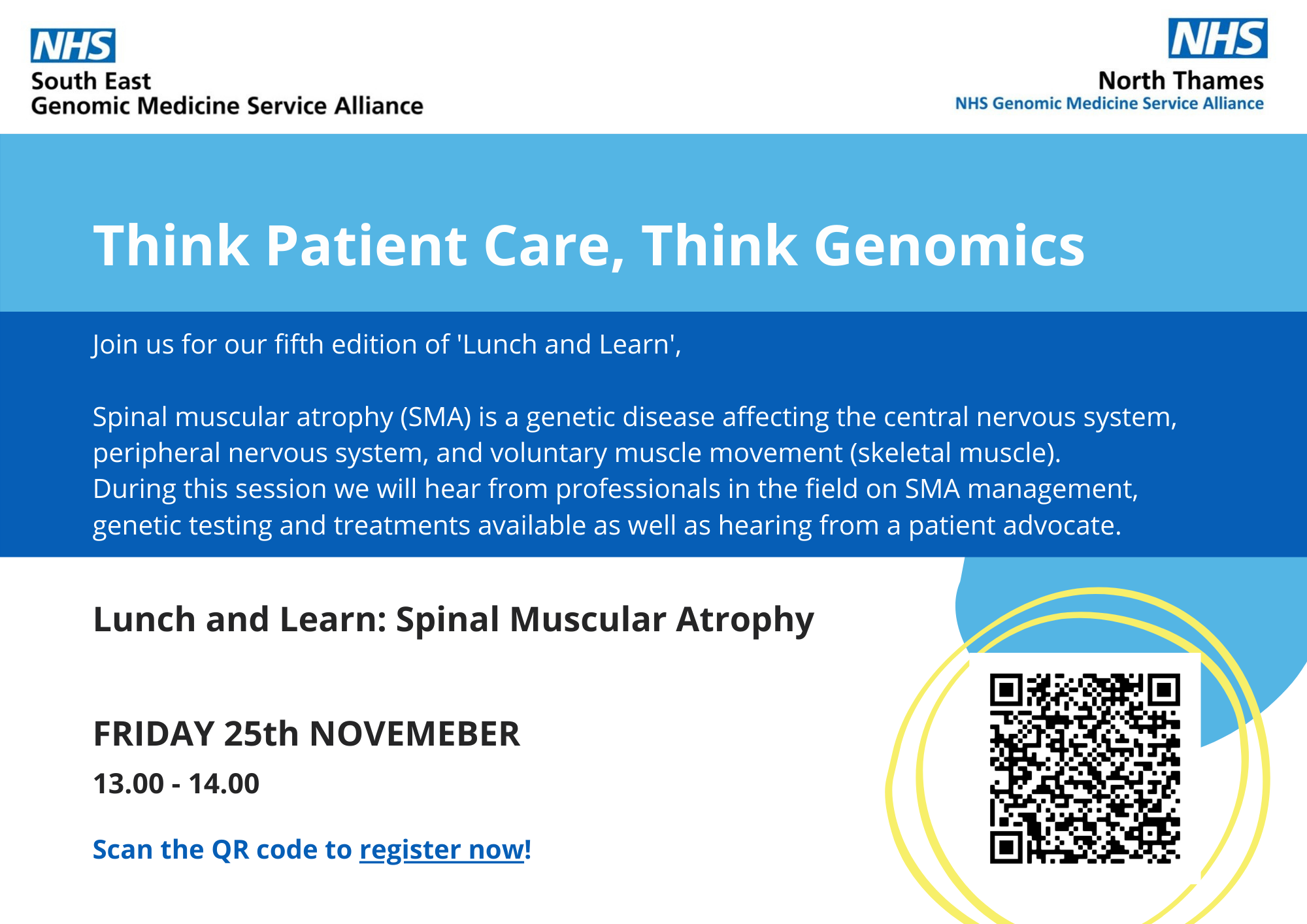
- This event has passed.
Lunch and Learn: Think Patient Care, Think Genomics
November 25 2022 @ 1:00 PM - 2:00 PM

Session Fifth: Spinal Muscular Atrophy
Spinal muscular atrophy (SMA) is a genetic condition affecting the central nervous system, peripheral nervous system, and voluntary muscle movement (skeletal muscle). During this session we will hear from professionals in the field on SMA management, genetic testing, and treatments available as well as hearing from a patient advocate.
Agenda:
13:00 – Welcome
13:05 – An introduction to Spinal Muscular Atrophy (SMA), Dr Samantha Yuen-Sum Chan, Consultant Paediatric Neurologist, St George’s University Hospitals NHS Foundation Trust
Samantha will be providing a brief introduction to SMA with a focus on early signs and symptoms and an overview of the available treatments.
13:20 – A parents experience of their son’s diagnosis, Portia Thorman, Advocacy Lead for SMA UK since January 2022
Portia will be speaking about her personal experience of her son’s diagnosis and how family life has changed since.
13:35 – Prenatal considerations of SMA, Dagmar Tapon, PhD, MSc Lead genetic counsellor, Centre for Fetal Care, Queen Charlotte’s and Chelsea Hospital, Imperial College Healthcare NHS Trust. Honorary senior lecturer at Imperial College
Dagmar will talk about prenatal testing for SMA, and other options at-risk parents have to complete their families.
13:50 – Panel discussion, Panellist – Clare Galtrey, Consultant Neurologist, St George’s University Hospitals NHS Foundation Trust and Frimley Park Hospital NHS Foundation Trust
Clare will be joining the panel alongside the speakers to discussion and will be available to answer questions around adult care and management.
14:00 Close
Bio’s:
Dr Samantha Chan MBChB PhD MRCPCH, Consultant Paediatric Neurologist, St George’s Hospital, London, Dr Chan was recently appointed consultant at St George’s, and see children with a range of neurological conditions, including those with neuromuscular diseases such as spinal muscular atrophy (SMA). She trained at Great Ormond Street Hospital, where she did weekly SMA clinics as part of the Neuromuscular team in 2016/2017. Dr Chan returned as Neuromuscular Fellow in 2021 to a completely changed landscape for SMA following the introduction of novel treatments which have transformed SMA type 1 from a disease uniformly fatal in infancy to a chronic condition where quality of life can be optimised through multidisciplinary interventions.
Portia Thorman, Advocacy Lead for SMA UK since January 2022, Portia works to advocate for equitable access to treatment and therapies, raise awareness of and take steps to resolve current issues in the UK SMA community. I work closely with our alliances such as MDUK, Genetic Alliance and DCP to name a few.
Porta brings the patient voice to the government, NICE, the SMA REACH adult and paediatric clinical networks and sit on the SMA Europe treatment committee. I also sit on the UK SMA Newborn Screening Alliance steering group, where my main role is patient engagement. I also work with pharmaceutical companies, supporting them to find the patients and with clinical trial design and outreach.
Personally, Portia is a mum to a very charming 6-year-old boy living with SMA type 1 and have many links to the community through social media networks.
Dagmar Tapon, PhD, MSc Lead genetic counsellor, Centre for Fetal Care, Queen Charlotte’s and Chelsea Hospital, Imperial College Healthcare NHS Trust. Honorary senior lecturer at Imperial College, Dagmar works as a specialist prenatal genetic counsellor. She works with families affected by genetic conditions, advising them about their reproductive options and supporting them through their pregnancies. Through her participation in research, she is closely involved with developing and introducing new genomic testing in prenatal diagnosis.
Dagmar is involved in regional training and teaches on several BSc and MSc programmes.
Clare Galtrey, Consultant Neurologist, St George’s University Hospitals NHS Foundation Trust and Frimley Park Hospital NHS Foundation Trust, Dr Galtrey has been a Consultant Neurologist at St George’s University Hospitals NHS Foundation Trust and Frimley Park Hospital NHS Foundation Trust since 2017.
Dr Galtrey graduated from Cambridge University with a medical degree and PhD on the effects on peripheral nerve injury on the brain. She did further research into Motor Neurone Disorders at Kings College, London before undertaking higher specialist training in neurology at St George’s Hospital.
Dr Galtrey has clinical interests in motor nerve diseases and epilepsy. She runs a regional Motor Nerve Clinic seeing patients with Spinal Muscular Atrophy and Motor Neurone Disease at St George’s Hospital. She also sees general neurology inpatients and outpatients and runs the epilepsy clinic and motor neurone disease clinic at Frimley Park Hospital.
Register your place via the Eventbrite page.
Recordings from previous sessions can be found on our website – click here
